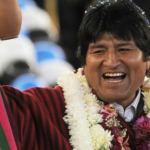In this election season in India and Latin America, there is both predictability and surprise. In India’s state elections, the ruling BJP-dominated the wins; in Brazil’s national election, a surprise candidate may defeat the incumbent President. In Bolivia’s October 12 national elections, predictability won hands down, with President Evo Morales sweeping the polls with over 60% of the votes, easily defeating his nearest rival Samuel Doria Medina.
This election, Morales did even better than in 2009 when he won with 53.7% of the votes. His party Movement for Socialism (MAS) also got a two-thirds majority in the Congress. Morales is the first Bolivian President to win in the first round with such a large majority in the last forty years.
There are many explanations for the success of Morales, now the longest-serving Bolivian President. The simplest is that he is from the poor, native indigenous community while his main opponent is a rich, European-origin businessman. The indigenous people, 60% of the Bolivian population, are the poorest. The white community is 15% of the population and are the best-off. Not surprisingly, despite being the majority in the population, the natives were marginalised and discriminated politically and economically for the last five centuries by the people of European-origin. It was Evo Morales who ended this historic domination by becoming the first indigenous President in 2006.
He immediately set about correcting the injustice by putting the indigenous people on the top of his economic and political agenda and has, over the years, vastly improved their lives. He has changed the constitution which institutionalises the empowerment of the indigenous people, and recognised their traditions and culture. Thanks to these moves, the number below the poverty line in Bolivia has dropped by 32% from 2000 to 2012. A report by the UNDP has placed Bolivia as the most successful in reducing poverty in the last decade in Latin America.
Although the west has labelled him a radical leftist, Morales has managed the economy prudently and pragmatically. He has financed his pro-poor programmes with the increase in revenue from exports such as gas and minerals. He has improved tax revenues and instituted better financial management by staying within the mandated budget. This has ensured Morales a fiscal surplus every year since 2006.
The GDP of Bolivia has grown an average of 5% from 2006 to 2013. It grew 6.8% in 2013 and is projected to grow 5.5% in 2014 and 5% in 2015. This is high, compared to the rest of Latin America’s 2.65% growth on average as well as the developed world. Foreign exchange reserves have increased from about $3 billion in 2006 to $14 billion in May 2014. The five-digit inflation that Bolivia suffered during the eighties is now a manageable 7%. Interest rates at 7 % are a contrast to the double digit rates of Brazil, Argentina and Chile. External debt is a controllable at $7.7 billion, largely stable since the $6.2 billion of 2006. Even the Financial Times was compelled to admit on 15 October has said, ‘ Mr Morales may well be Latin America’s most successful socialist presidents ever’.
Bolivia has never had such a long period of political stability and economic growth as it has experienced in the last eight years under President Morales. Once the poorest country in South America, Bolivia was notorious for coups and political instability. Of the 83 governments in its independent past, 36 lasted a year or less. Between 2001 and 2005 there were five Presidents.
Understandably, the European origin politicians and businessmen have not reconciled to the democratic logic of a President elected from the majority of the population. Constant plotting along with US outside support to destabilise Morales, is the norm with them. The province of Santa Cruz,rich in minerals and agriculture, along with a few others, even tried separation from La Paz. But Morales survived due to the solid support of the indigenous people and that provided by the Union of South American Nations, UNASUR.
Morales comes from a poor family and rose as a leader of the coca-cultivators union. The United States is unhappy with the coca leaf-worshipping Morales who has stopped the forced criminalization and eradication of coca farms in the country as part of the US war on drugs. He calls himself as the ‘worst nightmare of the US’. Morales stood upto the mighty Lula and Petrobras which had been receiving cheap Bolivian gas from Morales’ predecessors – and managed to get a higher price for the gas exported to Brazil.
Bolivia was in the spotlight in India when Naveen Jindal went there announcing a $2 billion investment in the El Mutun iron ore project. Unfortunately it was a failure due to faults on both the sides. India’s trade with Bolivia is not significant but there is good scope to increase exports.
Morales himself continues his simple lifestyle – with, of course, the Latino passion for football. He plays the game regularly – as member of a local Bolivian team.
Ambassador Viswanathan is Distinguished Fellow, Latin America Studies, Gateway House. He is the former Indian Ambassador to Argentina, Uruguay, Paraguay and Venezuela, and Consul General in Sao Paulo.
This article was exclusively written for Gateway House: Indian Council on Global Relations. You can read more exclusive content here.
For interview requests with the author, or for permission to republish, please contact outreach@gatewayhouse.in.
© Copyright 2014 Gateway House: Indian Council on Global Relations. All rights reserved. Any unauthorized copying or reproduction is strictly prohibited.


